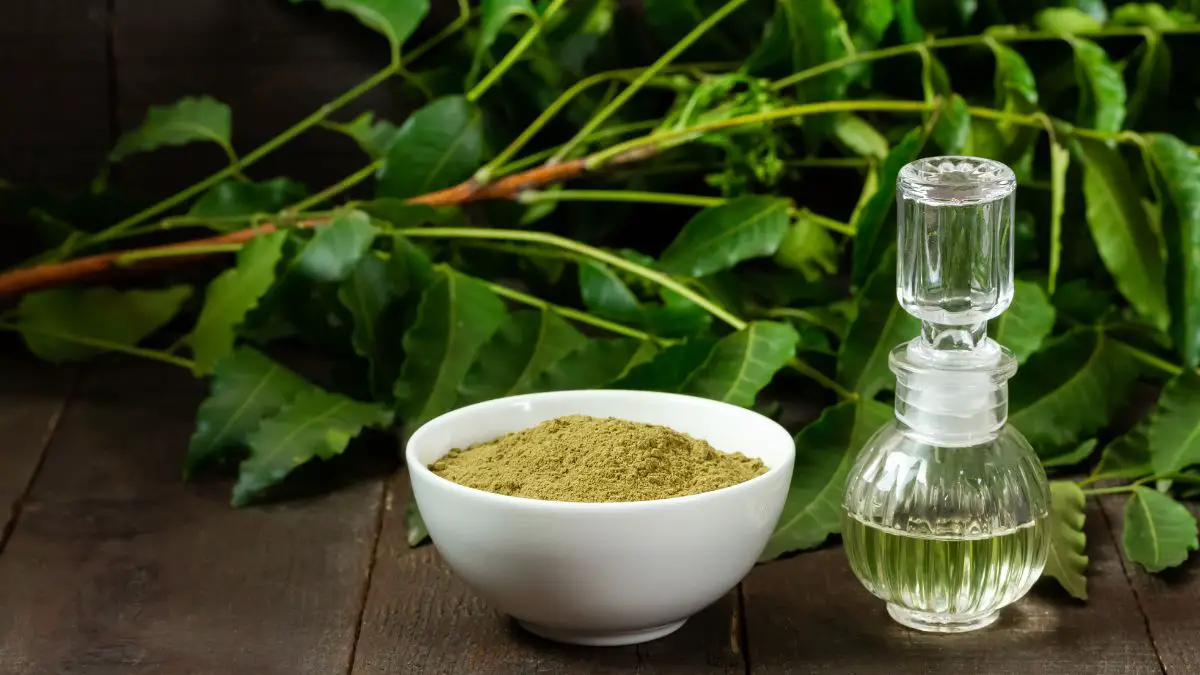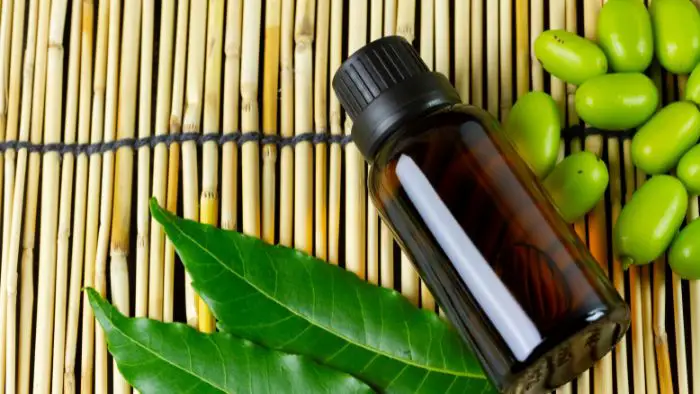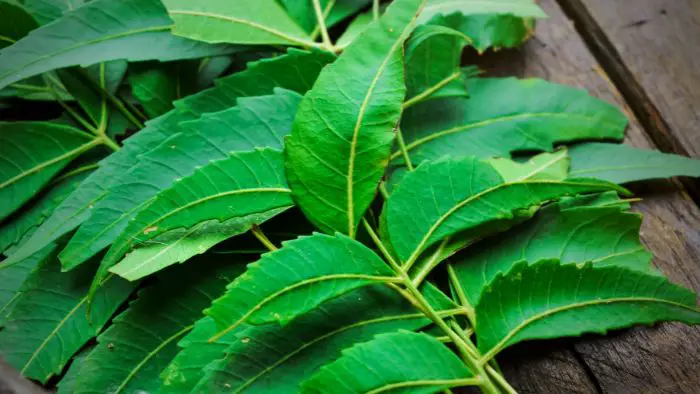Last Updated on November 11, 2022 by Guillermina
Neem oil is marketed as an organic insecticide and general cure all for plants. I love products containing neem, and, given that neem can be consumed as a human medicine, it is probably one of the safer treatments to use on your plants. Is neem oil safe to eat? In low concentrations yes, in high concentrations no. Let us delve into this matter a bit more carefully so that you can keep your plants, and yourself healthy by using the right dose of neem on the plants, and making sure that you don’t eat too much of this oil when you eat your garden produce.
What Is Neem Oil?
Before we ask “is neem oil safe to eat” it is probably good to know what neem oil is! Neem oil is pressed from the seeds of the neem tree – (Azadirachta indica). Neem oil contains a number of triterpenoids, which are basically composed of three terpene units attached together. Terpenes have gained popularity in the public literature recently due to their association with potentiating other aspects of the active ingredients in Cannabis.
The specific triterpenoids in Neem oil are quite toxic to humans in high doses – so just because it is natural does not mean it is safe.
How Does Neem Oil Work As A Pest Deterrent/Fungicide?
The triterpene Azadirachtin, along with other similar molecules in the oil inhibit the insect molting hormones -this basically means that the insect gets really fat inside its skin – and then cannot get out of the skin into a new bigger skin, as is typical of insects when they grow. This means it causes the insect to not be able to eat, and with time it just dies!!
As a fungicide, it is also moderately effective on certain fungi and very effective on others. By reducing insect populations, the number of damaged leaves that fungi can penetrate is also reduced. Insect pests are often vectors for fungal pathogens, so if you get rid of the insects, you reduce the fungi.
Ok, so we have ascertained that neem oil makes insects lose their appetite and it inhibits fungi – what does it do to us? Is neem oil safe to eat?
Is Neem Oil Safe To Eat?
Typically, the way this is tested is a bit weird and sad but confirmed to be accurate. Special types of rats and mice have been bred that have metabolic similarities with humans. If you feed specific doses of a chemical to an animal, you will find a point when 50% of animals die – this is called the LD50 or lethal dose at which 50% die.
The LD50 for mice is 31.95g of neem oil per kilogram of body mass – now that does not mean that if you eat less than that mass of neem oil, it will not have an effect on you – it will, and it is toxic, and has been shown to cause brain damage, liver and kidney damage and to cause women to abort babies at much lower doses.
Now we need to explore what low-dose neem exposure would do to you. The Environmental Protection Agency, or EPA, is charged with ensuring that both humans and the environment are minimally impacted by the use of various pesticides and antifungals. Here is their assessment of a commercial neem formulation. You will see that if used as per the instructions, this neem product poses no risk to human health. Or honeybee health for that matter. Read more about honeybees where I write here. Is neem oil safe to eat as a residue on treated plants? According to the EPA – yes, if you follow the manufacturer’s instructions for the specific neem product you use.
Can You Eat Plants Treated With Neem Oil?
As with all questions of this nature, it is important to apply common sense as well. If you have just sprayed a tomato fruit with neem oil, and you pick it and eat it, that is just being silly. With most pesticides and fungicides, there is a specified “withdrawal period” which is the amount of time that you should not consume the crop after application.
Neem oil actually tastes horrible, so, even if it is not toxic, you will have horrible bitter-tasting food if you eat it just after applying it! Typically three weeks is a decent withdrawal period. Washing your produce in lightly soapy water, followed by a rinse will help to further remove the residues (for example on eggplant or tomatoes).
Is neem oil safe to eat – it depends on how much, and it tastes horrible! So follow the correct withdrawal periods after spraying before you eat your crops. It will make them taste better. Personally, I only use neem during the non-fruiting stage of any of my plants. I don’t really trust the “Authorities” entirely, so if something is “safe” I am still doubtful. My Dad grew up in a time when DDT was “safe”. I grew up in a time when deltamethrin and glyphosate were “safe”. Time normally shows us that “safe” is “safe but…” and that stuff that gets added gets longer and longer as we have better tools to measure the damage.
Can Neem Oil Make You Sick?
Most definitely yes. All terpenes, and triterpenoids, in high doses, cause significant organ damage. Neem oil can cause brain damage, heart damage, liver damage, and kidney damage, and can even cause mutations in large doses. Do not consume neem oil as a medicine, unless it is a regulated, correctly formulated pharmaceutical product.
If you spray neem oil on your plants, be sure to read the label on the product you use and see what the withdrawal period is – this is the amount of time after the last application of neem that you must wait until it is safe to eat your crop.
An aside is that neem oil tastes really bad – if you find your crop tastes bitter or funny, then you should maybe wash it! From my personal experience of having tasted neem oil by mistake, I cannot say I could ever eat enough to do any damage. It is really disgusting in taste.
In Conclusion – Is Neem Oil Safe To Eat If Used As A Pesticide/Fungicide?
Yes. If you follow the instructions on your neem oil pesticide product, this is a low-harm product. It has been used for hundreds, if not thousands of years in India. There is no evidence to suggest that if you follow the instructions, it can harm you badly.
Dr. Garth A. Cambray is a Canadian/South African entrepreneur and beekeeper with 28 years of experience in apiculture and specializes in adding value to honey. His Ph.D. research developed a new advanced continuous fermentation method for making mead that has resulted in a number of companies globally being able to access markets for mead. His company, Makana Meadery, exports honey mead to the USA where it is available to discerning connoisseurs. He has also developed technologies to commercially manufacture organic honey vinegar in Zambia for export globally. He holds a few patents globally in the ethanol industry and believes in technology and knowledge transfer for human development and environmental sustainability. One of his proudest achievements is the fact that the wind farm he started at one of his old apiary sites has essentially made his hometown carbon neutral.




